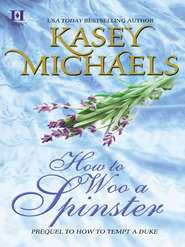По всем вопросам обращайтесь на: info@litportal.ru
(©) 2003-2025.
✖
Shall We Dance?
Автор
Год написания книги
2018
Настройки чтения
Размер шрифта
Высота строк
Поля
“No.”
“Nate.”
“No.”
“Nathaniel, Rowena is your godmother.”
“Damn.”
AS THE LAW OF AVERAGES (and Aunt Rowena) would have it, for every Perry Shepherd there is, also roped into the thing against his will and better judgment, a Sir Nathaniel Rankin.
And for every Bernard Nestor, alas, there is also an Esther Pidgeon. As dedicated as he, as rabid as he, but with her motives and loyalties in direct opposition to his, Esther believed the only way for the king to reign easily was to have that totally unsuitable Caroline removed, permanently.
To Esther the supposed queen is a slut, a whore, a flighty, unwashed animal, and her name must not be spoken in the liturgy each Sunday when the Crown’s loyal subjects were asked to pray for their king (pulling out and holding up religion like a sword was always such a marvelous rallying point for people like Esther).
Sister of the publisher of one of the lesser newspapers in the city, she’d already been made privy to this magnificent Bill of Pains and Penalties, and had spent half the evening rejoicing at the news.
This was her time. At last. She had been good, she had been patient, and now her time had come!
It is amazing how a woman like Esther Pidgeon can take one evening’s casual tumble into bed at a house party a quarter of a century earlier and mold that night, twist it about, until the Grand Florizel has become the Love of One’s Life, sadly pining for his dearest Esther but kept from her side by his royal duties. Why, he has even spent those sad, lonely years trying to find substitutes for her…all his women aging, fat, motherly. Just like Esther. Really. Especially the “fat” part.
But that was Esther, a woman who had dedicated her sad life to worshipping this oblivious man from afar.
And so the Bill of Pains and Penalties filled Esther with joy. For a while.
Now, as midnight neared, she paced the floor of her small chamber tucked into the second floor rear of her brother, Lewis’s, house and worried, then worried some more.
What if it didn’t work? What if Caroline slipped free of justice, as she had done the first time? Men, left to their own devices and shortcomings, often bungled things, badly.
Esther stood in front of the mantelpiece in her night rail, gazing up adoringly at the colored print of her dearest Florizel, a print she had surrounded with sprigs of rosemary and pretty pink bows, the whole of it lit by candles she placed on the mantel reverently, every night.
And then she would pull over the small embroidered stool, stand on it, stretch herself up, up, until she could place a kiss on Florizel’s hand—or whatever part of the man’s anatomy seemed appropriate for her mood, but it’s best not to dwell on that—before retiring to her lonely bed with two glasses of wine. One for herself, one for Florizel.
As Esther abhorred waste, she eventually would drink her absent lover’s wine as well and, over the years, the two glasses had somehow grown to two bottles, so that if Esther wasn’t always deep in her cups, she continued to make a valiant effort to become so.
But tonight? Tonight she was angry. Enough! She had suffered enough! Waited long enough!
Was she destined to live always in the shadows, waiting for Florizel to feel free to come to her? Or would she at last step up, stand up, and fight for what was hers? Yes! Yes, she could do that.
Caroline must die, Esther decided halfway into that night’s second bottle; there was nothing else for it. And anyone—anyone at all—who might dare to stand in the way of Esther’s…um, the king’s happiness, must die along with her.
All that was needed was a way, some way for Esther to insinuate herself into Caroline’s household.
THE SOON-TO-BE rather crowded household of the new queen woke hours earlier than the mistress of the place, to tend to their duties, to crowd around the butler, Carstairs, and listen to what the king had been up to now, then to tiptoe about the house, knowing it was going to be a difficult day. A difficult month. A difficult life…
Amelia, awake and dressed before dawn, had already penned a new menu for the day—one that consisted of Her Royal Majesty’s particular favorites—and she finally ran down the housekeeper-cum-companion, Mrs. Maryann Fitzhugh (and if that had been Fitzherbert, the woman would have been turned away in an instant!).
Mrs. Fitzhugh had come to the door, highly recommended and greeted with relieved resignation; for a housekeeper familiar with English ways was definitely needed, as was a paid companion, if Amelia was to go out and about at all during their time here in the house by the water.
Amelia felt certain she should have checked the woman’s thick sheaf of references, but time had been of the essence and still was, as the household was far from complete.
In the few days they had been in residence, Amelia had already learned that Mrs. Fitzhugh was…somewhat odd.
She chewed peppermints constantly, which was not all that terrible, except that the smell was at times over-powering (at least Amelia knew when the woman was approaching). She talked to herself, for another, and was doing so now, as Amelia entered the woman’s small quarters down a hallway from the kitchens.
“Should we be here, Mrs. Fitzhugh, in this den of iniquity, no matter that it’s just what we thought we wanted? Are we that selfish?”
And then she did that other thing that made Amelia uncomfortable. Mrs. Fitzhugh answered herself.
“Now, now, Maryann, she’s the queen, after all. One can’t climb much higher than to be housekeeper to a queen. Could have been a scullery maid, but he did better than that. And you know that’s not the whole of it, not by a long chalk. I vow, Maryann, you can be such a ninny.”
“Mrs. Fitzhugh! That was cruel!”
Amelia rubbed at her forehead, wondering if she should interrupt the two halves of the strange whole of Mrs. Maryann Fitzhugh, and then decided that if she continued to think of the woman as two persons, she might soon begin talking to herself.
“Mrs. Fitzhugh? Yoo-hoo,” Amelia said, rapping her knuckles on the doorjamb. “How are we—you—this morning?”
Mrs. Fitzhugh, her back to Amelia, lifted her hands to smooth her neat brown hair tied up in its usual severe bun, then turned to face her employer’s whomever (Mrs. Fitzhugh was still sorting that one out).
“Oh, good morrow, Mistress Fredericks,” she said, stretching her mouth into a tight smile. “I would have attended you if you had but rung for me.”
“Yes, I know,” Amelia said, entering the room, which was so neat and clean she was surprised it didn’t squeak. Everything here in England was so stiff and clean, and rigid. So unlike the easy atmosphere of Italy, for instance. “But I have penned some modifications to today’s menu and I thought you would prefer to present them to Cook?”
Mrs. Fitzhugh took the piece of paper, squinted at it as she silently mouthed the words, then frowned. “Partridges, mistress? I don’t know, mistress. The markets have already been open for two hours or more, and Cook would have to take herself there, to fetch good ones.”
“Oh, no, I can do that, if you’ll accompany me.”
Obviously Amelia’s response wasn’t the one Mrs. Fitzhugh had wished to hear. “You want to go pawing over raw birds? Can you do that?”
“Alas, Mrs. Fitzhugh, my folly knows no bounds. Yes, I believe I am up to the task. But you’re correct. Everything will have already been picked over, won’t it? Perhaps tomorrow? In the meantime, please ask Cook to do the best she can with the remainder of the list?”
Mrs. Fitzhugh nodded, and Amelia turned away, only to turn back when the woman said, “Carstairs took himself off, you know, mistress.”
“What? But he— What will we do without a butler? I don’t understand.”
“He read us all from the newspaper, mistress, and then said he would not stay in a den of iniquity. Those were his very words, mistress. ‘Den of iniquity.’ Two of the footmen and one housemaid hied off with him.”
“I see,” Amelia said, lifting her chin. So that’s where the den of iniquity remark had come from. She’d wondered. “Very well. Thank you, Mrs. Fitzhugh. Carry, um, carry on?”
The woman dropped into a very shallow curtsy. “I shall do that, mistress. And shall I put up a post for a new butler, two footmen, one housemaid…and I would very much like a helper of sorts. Can’t be traipsing about with you, mistress, and riding herd on the staff at the same time.”
The headache that had been knocking on the back of Amelia’s eyes finally gained admittance. “No, thank you, Mrs. Fitzhugh. I believe I can manage to have an advertisement posted…somewhere.”
Amelia then headed to the breakfast room and the re-folded newspaper that had been placed beside her plate.
She refused to look at it, acknowledge the thing’s presence. It was bad enough to know the truth of what was being planned, without adding supposition and titillation to the thing.
When one of the footmen still remaining—one that had traveled with them from Italy—entered the room with a fresh pitcher of water, she held up the newspaper and said, “Gerado, if you would burn this, please?”











